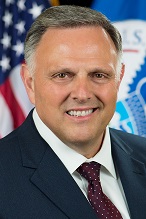As part of our two part blog series on hurricanes, today’s blog will discuss community resilience capacity—how we position the entire community to be part of recovery solutions. When a hurricane strikes, the impact can be devastating and costly. Knowing how to prepare differently in the future and improve decision-making on mobility, residential living, and economic development requires concentrated planning and innovative research and analysis. As a leader in this

Science and Technology
William Bryan
space, the S&T Office of University Programs-funded Coastal Resilience Center of Excellence, (CRC) led by the University of North Carolina at Chapel Hill (UNC-CH) in partnership with Jackson State University in Jackson, M.S., is changing the conversation on how public and private officials invest in pre-disaster and post-disaster recovery planning.
A key element of CRC’s research focuses on the impact hurricanes have on land and infrastructure. Using predictive analysis, a UNC-CH research team is developing re-location strategies to inform where residents should move outside flood plains to higher ground. In collaboration with statewide authorities, CRC Director Professor Gavin Smith and his team are embedded in some of the hardest hit and most underserved coastal communities in North Carolina as the lead for the Hurricane Matthew Disaster Recovery and Resilience Initiative, which is based out of FEMA’s NC Joint Field Office.
By integrating field research with urban planners, city officials, and robust citizen engagement, CRC is helping communities address the tough questions that effective recovery plans address. This includes determining what to do with open spaces (once citizens move), how to stimulate economic development, and how to incentivize new construction to ensure buildings are flood-proof, safe, and incorporating available smart technologies.
This research has the attention of North Carolina Director of Emergency Management, Mike Sprayberry, who aims to institutionalize validated methods and results by co-developing a resilience model with CRC, to “limit future loss of life and property.” CRC is “delivering outcome-based solutions, which is what we need to save lives and prepare our citizens for the future,” Mr. Sprayberry said.
These North Carolina coastal communities also serve as a living lab for S&T’s Flood Apex Program, where CRC is supporting the development of new technologies and methods to improve community resilience from flood disasters.
In another flood-impacted community, CRC partner Old Dominion University (ODU) is studying how underserved communities in southern Virginia are responding to similar vulnerabilities when faced with flooding and surge disasters. Through multiple stakeholder engagements, ODU Professor Michelle Covi and colleagues are using social science methodologies to learn how citizens are affected by the pressures of weekly flood disruptions, which have impacts on how they respond to evacuations and invest their community.
Currently, communities around Hampton Roads and Portsmouth Virginia experience 10 full days of flooding a year. But due to increased flooding, this will increase to above 55 days a year by 2050, where the impact on citizen mobility is consequential, notes Professor Covi.
To learn more, visit S&T and get connected today @dhsscitech on Twitter and Facebook!
